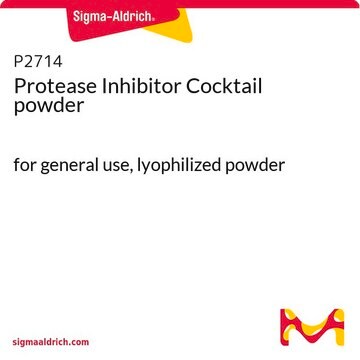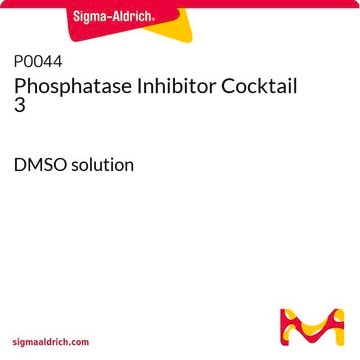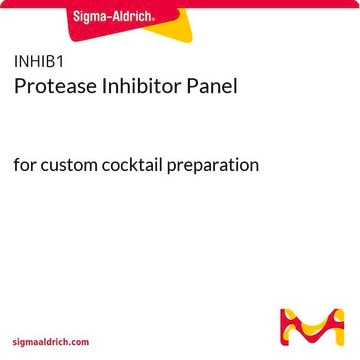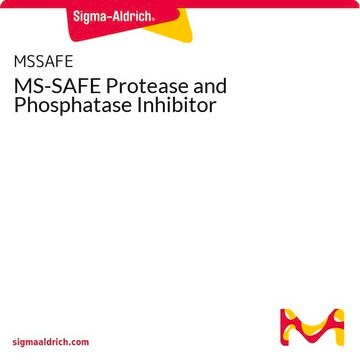P1860
Protease Inhibitor Cocktail
DMSO solution, for the inhibition of serine, cysteine, aspartic proteases and aminopeptidases, for use in tissue culture media, DMSO solution
Synonym(s):
Protease Inhibitor Solution, protease inhibitor
Sign Into View Organizational & Contract Pricing
All Photos(2)
About This Item
Recommended Products
product name
Protease Inhibitor Cocktail, for use in tissue culture media, DMSO solution
Quality Level
form
DMSO solution
shipped in
dry ice
storage temp.
−20°C
Looking for similar products? Visit Product Comparison Guide
General description
Protease Inhibitor Cocktail demonstrated non-toxicity towards the following cell lines after 48 hours exposure:
A431, CHO, COS, HepG2, and HeLa adherent cell lines
Jurkat and HL-60 cell lines grown in suspension
A431, CHO, COS, HepG2, and HeLa adherent cell lines
Jurkat and HL-60 cell lines grown in suspension
The Protease Inhibitor Cocktail is a mixture of protease inhibitors designed to prevent proteolytic degradation of secreted proteins in tissue culture media.
Specificity
Inhibits serine, cysteine, aspartic proteases, and aminopeptidases
Application
Protease Inhibitor Cocktail has been used:
- as a supplement in supernatants and lysates for ex vivo infection experiments using human precision-cut lung slices (PCLS)
- to inhibit proteolysis by trypsin to prove that proteolysis is responsible for restoration of catalysis of corona-inhibited nanozymes
- in trypsin solution for trypsin-inhibited studies
- as a component in radioimmunoprecipitation assay (RIPA) buffer to lyse leukocytes for western blot
This product is specifically optimized for use in tissue culture media and can be added after 48 hours of exposure to fresh medium to ensure the continued inhibition of proteases.
Biochem/physiol Actions
Protease inhibitor cocktail is designed for use in tissue culture media. It is recommended as an additive to tissue culture media to safeguard against the degradation of secreted proteins originating from the cultured tissue.
Features and Benefits
- Broad specificity
- Non-toxic: After 48 hours exposure, the product is non-toxic to adherent cell lines A431, CHO, COS, HepG2 and HeLa; and to Jurkat and HL-60 cell lines grown in suspension.
- Contains no metal chelators: Ensures compatibility with downstream applications
- Convenient packaging: 1 mL in glass bottle
- Easy to use: Use at a dilution of 1:200 or more in tissue culture media to prevent proteolytic degradation of secreted proteins.
Components
Aprotinin
Bestatin
E-64
Leupeptin
Pepstatin A
Bestatin
E-64
Leupeptin
Pepstatin A
Caution
After 48 hours exposure, the product is non-toxic to adherent cell lines A431, CHO, COS, HepG2 and HeLa; and to Jurkat and HL-60 cell lines grown in suspension.
Quantity
Use at a dilution of 1:200 or more in tissue culture media to prevent proteolytic degradation of secreted proteins.
Physical form
Solution in DMSO (D 2650, Hybri-Max).
Other Notes
For R&D use only. Not for drug, household, or other uses. Please consult the Safety Data Sheet for information regarding hazards and safe handling practices.
related product
Product No.
Description
Pricing
Storage Class Code
10 - Combustible liquids
WGK
WGK 1
Flash Point(F)
188.6 °F
Flash Point(C)
87 °C
Certificates of Analysis (COA)
Search for Certificates of Analysis (COA) by entering the products Lot/Batch Number. Lot and Batch Numbers can be found on a product’s label following the words ‘Lot’ or ‘Batch’.
Already Own This Product?
Find documentation for the products that you have recently purchased in the Document Library.
Customers Also Viewed
Noëlle Dommann et al.
Cancers, 12(7) (2020-07-19)
Colorectal cancer, along with its high potential for recurrence and metastasis, is a major health burden. Uncovering proteins and pathways required for tumor cell growth is necessary for the development of novel targeted therapies. Ajuba is a member of the
Olga V Nikolskaia et al.
The Journal of clinical investigation, 116(10), 2739-2747 (2006-09-26)
In this study we investigated why bloodstream forms of Trypanosoma brucei gambiense cross human brain microvascular endothelial cells (BMECs), a human blood-brain barrier (BBB) model system, at much greater efficiency than do T. b. brucei. After noting that T. b.
Low Expression of Sirtuin 1 in the Dairy Cows with Mild Fatty Liver Alters Hepatic Lipid Metabolism.
Yu Li et al.
Animals : an open access journal from MDPI, 10(4) (2020-04-02)
Dairy cows usually experience negative energy balance coupled with an increased incidence of fatty liver during the periparturient period. The purpose of this study was to investigate the effect of hepatic steatosis on the expression of the sirtuin 1 (SIRT1)
Asja Guzman et al.
Biomaterials, 115, 19-29 (2016-11-24)
Invasive breast cancer and other tumors of epithelial origin must breach a layer of basement membrane (BM) that surrounds the primary tumor before invading into the adjacent extracellular matrix. To analyze invasive strategies of breast cancer cells during BM breaching
Matthew Townsend et al.
The Journal of physiology, 572(Pt 2), 477-492 (2006-02-14)
The accumulation of amyloid beta-protein (Abeta) in brain regions serving memory and cognition is a central pathogenic feature of Alzheimer's disease (AD). We have shown that small soluble oligomers of human Abeta that are naturally secreted by cultured cells inhibit
Our team of scientists has experience in all areas of research including Life Science, Material Science, Chemical Synthesis, Chromatography, Analytical and many others.
Contact Technical Service













